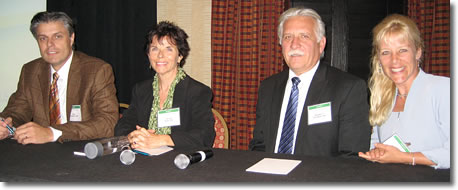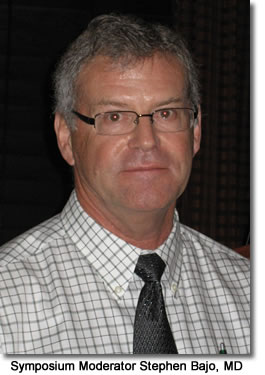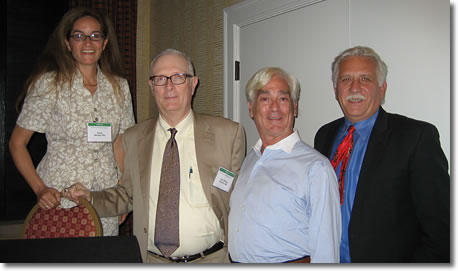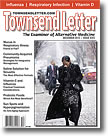|
On September 21 and 22, 2012, the Institute for Medical Studies sponsored the sixth Annual Probiotic Symposium on "Optimizing GI Health with Probiotics, Prebiotics, and Nutritive Factors," held in San Diego, California. The symposium was supported in part by an unrestricted grant from Klaire Labs. An acclaimed faculty provided an evidence-based review of the vital role of a balanced, diverse gastrointestinal microbiota as the foundation for good gastrointestinal and general health. The clinical importance of a healthful diet, probiotics, and prebiotics was emphasized. The appropriate use of various nutritive factors such as melatonin, zinc carnosine, glutamine, and fish oil was highlighted. Dr. Stephen Bajo, medical director of physician services for Renown Health, a nationally recognized integrated health system in Reno, Nevada, moderated the symposium.
Dr. Ingrid Kohlstadt, an associate at the Johns Hopkins Bloomberg School of Public Health, opened the symposium with an overview of the pivotal role of the intestinal microbiota in the normal development and continued normal functioning of the gastrointestinal system. She discussed the reduced probiotic effect of today's yogurt, emphasizing the reduced nutrient and increased inflammatory marker content of cow's milk, as well as the adverse nutritional effects of pasteurization and heat treatment. (See also her column, p. 111.) Kohlstadt touched on the use of probiotics to promote the breakdown of oxalate and the role of gut dysbiosis in the development of obesity and metabolic syndrome.

Day 1 Panel: Mark Pimentel, MD; Carolyn Dean, MD;
Stephen F. Olmstead, MD; Ingrid Kohlstadt, MD
Dr. Georges M. Halpern, Distinguished Professor of Pharmaceutical Sciences at Hong Kong Polytechnic University, provided an understanding of the gastrointestinal microbiota and health. He reviewed the physiology of gastrointestinal esophageal reflux and the limitations of current medical therapies. Halpern discussed the adverse effects of proton pump inhibitors (PPI) and presented evidence for the use of melatonin as an effective alternative to PPI. He discussed the data on use of zinc carnosine as a treatment modality for peptic ulcer disease. He concluded his talk with an exploration of mechanisms of probiotics in gut health.
 Dr. Mark Pimentel, director of the GI Motility Program and Laboratory at Cedars-Sinai Medical Center and assistant professor at the David Geffen School of Medicine at the University of California, Los Angeles, reviewed his research on the pathogenesis of small intestine bacterial overgrowth (SIBO) and its medical treatment. He detailed the pathophysiology of SIBO and current diagnostic methodologies, including lactulose breath testing and small intestine bacterial cultures. He noted that SIBO is common among people suffering with irritable bowel syndrome (IBS) and that people with IBS predominated by diarrhea often have lactulose breath tests characterized by excessive hydrogen production, while constipation-predominated IBS is marked by excessive methane production on breath testing. Pimentel examined the epidemiology and pathophysiology of postinfectious IBS and speculated that most, perhaps all, IBS could be postinfectious. He presented his research data on the role of Campylobacter jejuni and cytolethal distending toxin in the pathogenesis of SIBO, and summarized his experience on appropriate treatment. Dr. Mark Pimentel, director of the GI Motility Program and Laboratory at Cedars-Sinai Medical Center and assistant professor at the David Geffen School of Medicine at the University of California, Los Angeles, reviewed his research on the pathogenesis of small intestine bacterial overgrowth (SIBO) and its medical treatment. He detailed the pathophysiology of SIBO and current diagnostic methodologies, including lactulose breath testing and small intestine bacterial cultures. He noted that SIBO is common among people suffering with irritable bowel syndrome (IBS) and that people with IBS predominated by diarrhea often have lactulose breath tests characterized by excessive hydrogen production, while constipation-predominated IBS is marked by excessive methane production on breath testing. Pimentel examined the epidemiology and pathophysiology of postinfectious IBS and speculated that most, perhaps all, IBS could be postinfectious. He presented his research data on the role of Campylobacter jejuni and cytolethal distending toxin in the pathogenesis of SIBO, and summarized his experience on appropriate treatment.
Dr. Carolyn Dean, founder of Doctor of the Future Publications and an authority on candidiasis sensitivity syndrome and women's health, discussed the epidemiology of irritable bowel syndrome and outlined dietary, probiotic, and nutritive factor interventions that may provide patients with symptomatic relief in this very common gut disorder that affects more than 20% of the population. Dean emphasized the numerous adverse health effects of high-fructose corn syrup (HFCS) and highlighted the benefits for people with IBS of avoiding HFCS. She reviewed the evidence for Candida albicans, chemical sensitivity, and stressin the etiology of IBS. Dean presented the evidence for a drug-free approach to treating IBS, which includes eliminating causes of increased gut permeability and the use of probiotics, glutamine, quercetin, and herbs such as slippery elm, sheep sorrel, and licorice root to heal the intestines.

Day 2 Panel: Sonia
Michail, MD; Trent William Nichols, MD;
Russell Jaffe, MD; Stephen F. Olmstead, MD
Dr. Trent William Nichols Jr., a practicing gastroenterologist and internist at Kaiser Permanente in Hanover, Pennsylvania, and editor of Optimal Digestion: New Strategies for Achieving Digestive Health, outlined an integrative approach to viral hepatitis, nonalcoholic steatohepatitis (NASH), obesity, and metabolic syndrome. After reviewing the epidemiology and pathophysiology of these disorders, Nichols presented the clinical and laboratory measures useful for making their diagnoses. He gave an overview of standard medical measures to treat NASH. He noted that oxidative stress is a key catalyst in the development of NASH and highlighted the protective roles of vitamins C and E. He noted the results of small studies showing the benefits of ursodeoxycholic acid, betaine, and silymarin in patients with NASH. Nichols summarized the evidence for beneficial effects of probiotics in both alcoholic and nonalcoholic fatty liver disease. He concluded with a discussion of the possibilities for direct current electromagnetic field therapy for obesity.
Dr. Russell Jaffe, internist, molecular biochemist, clinical pathologist, diagnostician, and lab director of ELISA/ACT Biotechnologies LLC and Perque LLC, provided an overview of food intolerances, a problem affecting many patients. He began by reviewing normal and disordered immune responses. Jaffe divided food allergies into type 1 histaminic allergies and delayed allergic responses best assessed by lymphocyte response assays. He noted that identification of offending foods and their removal from the diet is fundamental to the management of food allergies and intolerances. Jaffe reviewed the role of prebiotics, probiotics, and useful nutrients such as glutamine, magnesium, buffered L-ascorbate, coenzyme Q10, mixed natural tocopherols, and adequate cholecalciferol. He ended with a discussion of the immunologic aspects of gluten sensitivity and celiac disease.
Dr. Sonia Michail, associate professor of pediatrics at the Keck School of Medicine of the University of Southern California and attending physician at Children's Hospital Los Angeles, summarized the role of probiotics and prebiotics in the treatment of inflammatory bowel disease. Michail began by defining probiotics and prebiotics and noted the explosive growth of interest in probiotics over the past decade. She briefly touched on probiotic mechanisms of action and then went on to review the role of a deranged immune response to commensal enteric bacteria in the pathogenesis of inflammatory bowel disease. Michail proceeded to review the clinical evidence for the use of probiotics in inflammatory bowel disease. She found that the evidence to support the use of probiotics to prevent and treat pouchitis is strong. She referenced studies showing that probiotics are as effective as medical therapies in maintaining remission in ulcerative colitis. She concluded that studies of probiotics for Crohn's disease, mostly involving Lactobacillus rhamnosus GG, have been disappointing, and she therefore did not recommend probiotics for Crohn's disease based on published meta-analyses.
Dr. Stephen Olmstead, chief science officer of Klaire Labs, reviewed gastrointestinal and systemic disease associated with gut Candida colonization. He reviewed the microbiology of Candida albicans and other Candida species. He noted that Candida species are highly immunogenic and are associated with systemic allergies. Olmstead reviewed recent research showing that Candida colonization is associated with peptic ulcer disease and inflammatory bowel disease. He presented studies showing that Lactobacillus probiotics are as effective as antifungals in reducing intestinal Candida populationsand promoting healing of ulcers and colitis. Olmstead provided evidence that candidiasis sensitivity syndrome is due to host immune response to gastrointestinal Candida biofilm communities. He defined biofilm as a heterogeneous community of attached microorganisms encased in a self-produced matrix and reviewed what is currently known about Candida biofilms. Olmstead reviewed the evidence for use of an enzyme formulation to disrupt Candida and other pathogenic biofilms. He outlined a clinical approach to disrupting Candida biofilm through yeast eradication using herbal or pharmaceutical antifungals. He provided evidence for the role of probiotics and prebiotics to restore and support a healthy gastrointestinal microbiota and support mucosal immunity.
The symposium concluded with a faculty panel discussion moderated by Bajo. Members of the audience were encouraged to pose questions to the panel for discussion and scientific debate of the data presented during the program.
A set of audio CDs with the accompanying symposium syllabus is available for order at www.ProbioticSymposium.com. The seventh Annual Probiotic Symposium, which will focus on current controversies in probiotics research and use, is planned to take place in fall 2013.
|



![]()
![]()
![]()


 Dr. Mark Pimentel, director of the GI Motility Program and Laboratory at Cedars-Sinai Medical Center and assistant professor at the David Geffen School of Medicine at the University of California, Los Angeles, reviewed his research on the pathogenesis of small intestine bacterial overgrowth (SIBO) and its medical treatment. He detailed the pathophysiology of SIBO and current diagnostic methodologies, including lactulose breath testing and small intestine bacterial cultures. He noted that SIBO is common among people suffering with irritable bowel syndrome (IBS) and that people with IBS predominated by diarrhea often have lactulose breath tests characterized by excessive hydrogen production, while constipation-predominated IBS is marked by excessive methane production on breath testing. Pimentel examined the epidemiology and pathophysiology of postinfectious IBS and speculated that most, perhaps all, IBS could be postinfectious. He presented his research data on the role of Campylobacter jejuni and cytolethal distending toxin in the pathogenesis of SIBO, and summarized his experience on appropriate treatment.
Dr. Mark Pimentel, director of the GI Motility Program and Laboratory at Cedars-Sinai Medical Center and assistant professor at the David Geffen School of Medicine at the University of California, Los Angeles, reviewed his research on the pathogenesis of small intestine bacterial overgrowth (SIBO) and its medical treatment. He detailed the pathophysiology of SIBO and current diagnostic methodologies, including lactulose breath testing and small intestine bacterial cultures. He noted that SIBO is common among people suffering with irritable bowel syndrome (IBS) and that people with IBS predominated by diarrhea often have lactulose breath tests characterized by excessive hydrogen production, while constipation-predominated IBS is marked by excessive methane production on breath testing. Pimentel examined the epidemiology and pathophysiology of postinfectious IBS and speculated that most, perhaps all, IBS could be postinfectious. He presented his research data on the role of Campylobacter jejuni and cytolethal distending toxin in the pathogenesis of SIBO, and summarized his experience on appropriate treatment.
